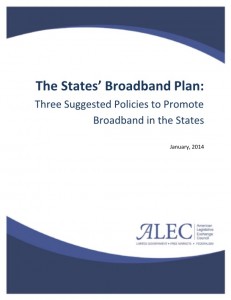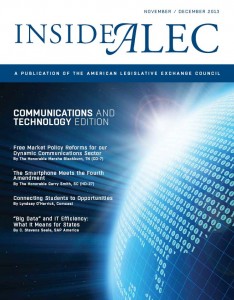Broadband
Key Points
- Regulators should find ways to facilitate the expansion of provision of communications services in their jurisdictions rather than becoming another hurdle to success.
- Regulators of communications services should move quickly to make a final decision when application for expansion of communications services is made in their jurisdiction.
- Rights-of-way fees should be limited to the actual cost of rights-of-way administration, and should be recovered in a competitively neutral manner.
- Municipalities should limit their ownership and operation of communications and advanced services or facilities. When municipalities do provide such services safeguards must ensure that private providers with whom the municipality competes are not disadvantaged by the municipality in the exercise of its bonding and taxing authority, management of rights of way, assessment of fees or taxes, or in any other way.
Access to a fast Internet connection returns a great of value to consumers. Whether for education, furthering a career, innovating or just enjoying entertainment, broadband access can open new worlds of opportunity. The great news is that the promise of broadband is being realized across the country, in urban and rural communities, including all demographics, amongst the middle class and the poor.
Widespread efforts to promote broadband adoption, use and digital literacy are critical to improving the nation’s long-term competitiveness in a global market, and to achieving certain socioeconomic improvements in the quality of American life. Expanding adoption, use and digital literacy skills will allow a greater number of Americans to fully take advantage of the benefits of broadband based applications such as tele-health, energy management and education opportunities online
By any objective measure, the rollout of broadband services in the U.S. is going phenomenally well, and is largely being done with private capital and without involving taxpayer dollars. As you might expect, broadband providers have focused on areas where demand and market forces sufficiently incentivize private network companies. But there obviously are some challenges in areas where, for reasons of geography, population density, or other issues, making a business case for deploying broadband.
Free market policies provide the best answer for the provision of broadband to the greatest number of people in the greatest number of places. In many cases government needs to get out of the way and let the market be free to provide demanded services. To the extent that coverage is not reasonably complete then other small government approaches are an option.
Model Policies
-
Resolution In Support of Telehealth Modernization Principles
WHEREAS, laws and regulations should allow health care providers to practice the full extent of their professional training and expertise through telehealth; WHEREAS, laws and regulations should permit health care providers to deliver all forms of telehealth, including real-time video consultations, remote patient monitoring, and store-and-forward technology; WHEREAS, all health…
-
Resolution Supporting Efforts of Telehealth Working Group Final
WHEREAS, the cost of healthcare has grown an average of 2.4 percent faster than GDP since 1970 and currently represents 18 percent of the United States’ total GDP; and WHEREAS, the lack of access to health care in rural areas is contributing significantly to these increasing costs; and WHEREAS, 21…
-
Statement of Principles for Cybersecurity Final
WHEREAS, it is the mission of the American Legislative Exchange Council (ALEC) to advance the principles of free markets, limited government and federalism; and WHEREAS, effective cybersecurity is essential for the proper function of government and continued growth of the economy in cyberspace; and WHEREAS, cyber challenges could pose an…
-
Employee Online Privacy Act Final
Employee Online Privacy Act Summary Job applicants and employees are increasingly using online accounts for their personal communication and social networking. Potential and actual employers should not request or require access to these personal accounts, except in cases where the employer is obligated to investigate activities that may involve…
-
Information Security Management Act Final
Information Security Management Act Summary An act concerning cyber security for communication and information resources in public agencies, and making an appropriation in connection therewith. Be it enacted by the General Assembly of the State of _____________: Section 1. Article _____ of title _____, ___________ Revised Statutes,…
-
Resolution Protecting Online Platforms and Services Final
WHEREAS, the Internet has created millions of new American jobs and generated billions of dollars in revenue for American businesses; WHEREAS, online platforms enabled users to generate, upload, and share their own content, and this capability has become a core component of the online experience; WHEREAS, ALEC’s principles of limited…
Press Releases
-
ALEC Applauds Congressional Approval of Spectrum Auctions to Promote Broadband
Contact: Kaitlyn Buss Phone: 202-742-8526 Email: kbuss@alec.org ALEC Applauds Congressional Approval of Spectrum Auctions to Promote Broadband Washington, D.C. (February 17, 2012) — Today…




